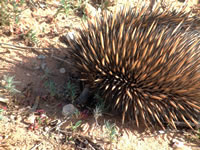|
||||||||||||||||||||||||||||||||||||||||||||||||||
| Australian Wildlife Biology - BEES7201 | ||||||||||||||||||||||||||||||||||||||||||||||||||

Description The conservation of natural ecosystems is a topic of immense social significance. This is particularly true in Australia, since not only our animals and plants are unique, having evolved for millions of years in isolation from life on other continents, but our ecosystems are considered some of the most fragile on earth. In this course the broad spectrum of the Australian flora and fauna is explored via lectures and hands-on experience in practical classes and a weekend excursion. As well as providing a basic grounding in Australian biodiversity, the factors that have shaped it are examined, as well as the challenges faced in its future survival. The influence of people, both indigenous and newly-arrived, is also considered, especially in regard to conservation problems that are of current interest either because of their inherent ecological significance or because they exist within a complex social framework. The knowledge gained in this course will help you to make intelligent and useful contributions to the discussion of a wide range of ecological issues.
Note/s: There will be a one weekend excursion to the UNSW field station at Smith Lake near Seal Rocks, on the Central Coast (Friday night to Sunday afternoon). Some personal expense will be incurred.
|
||||||||||||||||||||||||||||||||||||||||||||||||||


